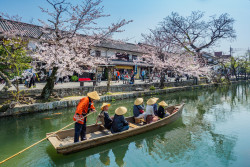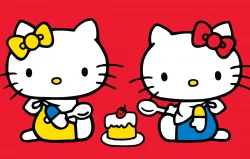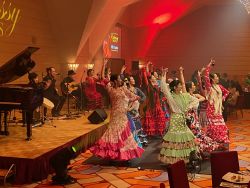
June 4, 2009
Band of Sisters
After finding fame as otaku idols, the Nakano Fujoshi Sisters are striking gold as a boy group
By Metropolis

Nakano Fujoshi Sisters
It was only last July that the NFS had their first hit as an idol group, “GO! FIGHT! Fujoshi Sisters” produced by Jazzy Hanawa, an alter ego of the zany solo comedian Hanawa. Originally released only for cellphones, the eccentric song became a hit among otaku.
“We’ve gotten used to it by now, but when we first heard the original music Jazzy Hanawa made for us, we thought, ‘What is this?’” admits Kyan. “It was really weird.”
“The first song was about female otaku as seen through Jazzy Hanawa’s eyes,” adds Ura. “For example, finding boyfriends online, or having anime character boyfriends.”
Hanawa also produces the NFS in their guise as Fudanjuku, but there are several differences between the groups. The “boys,” for instance, aren’t as geared towards in-jokes and cultural references.
“Fudanjuku are more oriented towards society,” Inui says. “The songs have themes and messages such as ‘cherish humanity,’ ‘friendship’ and ‘love.’ That sort of simple message is common, but there are points to be learned from it and people can respond to it. Even though the lyrics are simple and kind of lame, the value of the message is high.”
Fudanjuku had their own major break with “Otokozaka” in September 2008. The media buzz around the group is strong—Suzanne praised them as otakakkoi, or “otacool.” Their second single made it to No. 11 on the Oricon singles chart, and the boys are drawing in new crowds—about 40 percent of concert goers are female.
The appeal of a cross-dressing lady is not without precedent in Japan. There’s the Takarazuka Revue, an all-female song-and-dance troupe that had its debut in western Japan in 1913. The shows are celebrated for being lavishly over-the-top in everything from music and costume to sets, choreography and melodramatic story lines. The performers are unmarried women, divided into musumeyaku (girl roles) and otokoyaku (male roles), who master and embody the ideal characteristics of the gender they portray. The otokoyaku are the stars, and fans say these gallant gents are manlier and more ideal than any man could be.
Takarazuka is also deeply tied to the rise of anime and manga. Osamu Tezuka, the late “god of manga,” watched the shows with his mother, and they are said to have been the basis of his Princess Knight, released in 1953 as the first manga targeting female readers. The protagonist, Princess Sapphire, has both a male and female heart and desires to fight as a prince while also being a refined princess. Tezuka in turn influenced Riyoko Ikeda’s immortal The Rose of Versailles, which was adapted into one of Takarazuka’s most beloved shows. The Revue also inspired the hit Sakura Taisen franchise of games, anime and musicals.
Fans of Fudanjuku see the girls as closer to the ideal male of shojo manga, especially the hunky heroes of male-on-male yaoi, or “boys love.” Moreover, the fan knows that the “beautiful boy” is actually a female in disguise, which reduces tension and makes interaction easier. The same way the NFS share the otaku hobbies of their male fans, Fudanjuku is plugged into the fujoshi fantasy and accessible to women. They have something for girls, boys and everything in between.
In fact, Otome Road in Ikebukuro is home to a variety of cafes specializing in danso, or “male disguise.” Waitresses dress up like beautiful boys, serve their female customers, and make conversation about their hobbies. Danso cafés began appearing in the mid-2000s and are somewhat akin to host clubs—only without the men. They’ve become popular enough to gather a male fan base and have spread to Akihabara.
“It doesn’t really change anything how they dress,” says Takumi Saito, a maid enthusiast from Osaka visiting Queen Dolce, a danso café in Akihabara. “Cute is cute.”
On the cutting edge of a variety of otaku trends, the NFS are also trendsetters overseas. When the girls visited the C3 convention in Hong Kong in April, they were met by hordes of fans who came to their show with homemade Fudanjuku costumes and props. The majority had learned of the group from YouTube.
Inui says this was very rewarding for the band, whose charter goal is to spread “space peace” through anime and anisongs—and maybe contribute to a more relaxed view of gender along the way.
For more information about the Nakano Fujoshi Sisters, see www.nfs724.com.







